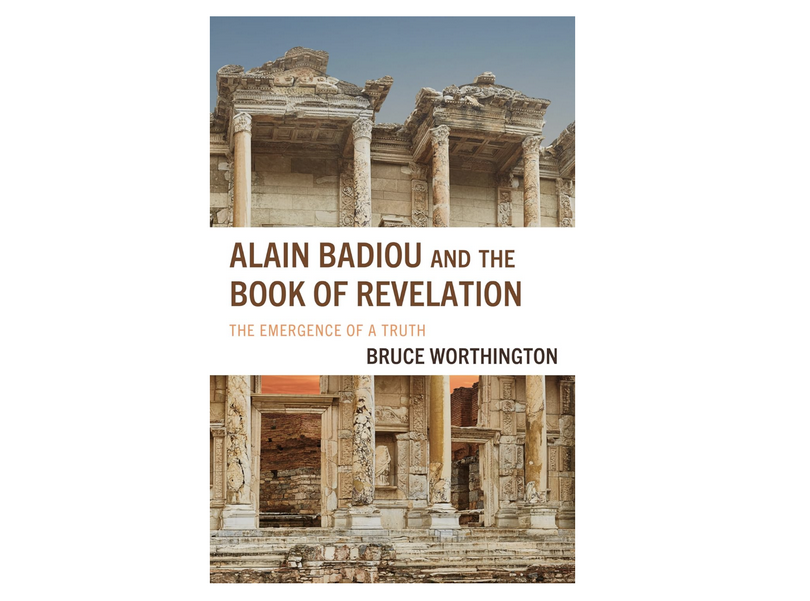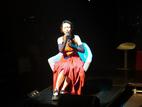On September 13, Professor Bruce Worthington launched his new book, Alain Badiou and the Book of Revelation: The Emergence of a Truth, at an event held at the Chinese University of Hong Kong (CUHK).
The launch was hosted at the CUHK bookstore and was organized in collaboration with the Divinity School of Chung Chi College and the Department of Cultural and Religious Studies.
Overview of the Book
Bruce’s book situates Christian theology within this framework, arguing that the resurrection of Jesus can be understood as such an event—a historical occurrence that continues to unfold new consequences throughout time. He charts how Christian theology, from its origins in the first-century Roman Empire to its contemporary manifestations, has been a continuous process of living out the consequences of this event.
One of the key claims of the book is that Christian theology is finite, singular, universal, and absolute, according to Badiou’s categories for a "truth procedure." Christian theology is finite in that it is constructed within a specific historical world with its own material conditions, yet it is also universal in its accessibility and its continual re-emergence in different contexts and cultures. Bruce also critiques contemporary Christianity, particularly in the West, for its alignment with capitalism, which he argues has diluted its potential as a revolutionary political force. He suggests that any future Christian Reformation will require a fundamental break from capitalism in order to reclaim its radical potential.
Happiness and the Event
During the book launch, Bruce elaborated on Badiou’s concept of happiness, which plays a significant role in understanding the subjective experience of living out the consequences of an event.
For Badiou, happiness is not an object to be pursued or achieved as a final goal. Instead, it is found in the ongoing process of living out the consequences of an event, whether that event is political, amorous, artistic, or scientific. In other words, happiness is experienced in the subjective commitment to an event and in the fidelity to its unfolding truth. Bruce connected this concept to Christian theology, suggesting that the true happiness of a Christian subject lies in their active engagement with the consequences of the resurrection and in their commitment to its revolutionary implications.
He emphasized that this happiness is not static or comfortable; it requires militancy and radical dedication, especially as the event challenges the established powers and norms of the world. Whether in the political, scientific, or amorous domains, those committed to an event must persist in their fidelity, even in the face of opposition or hardship.
Q&A Session
Following the presentation, Bruce engaged with the audience in a Q&A session, where several key points were discussed in more depth:
One question was about the relationship between power and truth, particularly in the context of political events. Bruce explained that for Badiou, truth is inherently subversive because it introduces something radically new into a historical situation, often challenging the existing structures of power. The powerful—those who benefit from the established order—frequently resist the consequences of an event because these consequences erode their power base. Bruce illustrated how the resurrection of Jesus had profound consequences for the Roman Empire, which was the center of power at the time.
Another question addressed the idea of contemporary Christianity’s relationship to capitalism. Bruce reiterated that modern Christianity, particularly in the West, has become an apparatus supporting capitalist structures rather than challenging them. He suggested that the next Christian Reformation would likely involve a decisive break from capitalism, allowing Christianity to once again serve as a revolutionary force that challenges the dominant political and cultural order.
The discussion also touched on what it means to "live out the consequences" of an event, specifically in the context of political revolutions. Bruce clarified that the consequences of an event are rarely apparent while the event is unfolding. Often, the significance of an event is understood retroactively, as subjects reflect on its implications and decide to live in fidelity to those consequences. He cited the example of the social movements in Hong Kong during the 2010s, suggesting that it is still too soon to determine whether these movements represent a true event. The subjectivity of those involved will determine whether they continue to live out the consequences of the movement.
An interesting question was raised about whether the four domains of truth—love, art, science, and politics—could overlap. Bruce affirmed that these domains are not mutually exclusive and can intersect in meaningful ways. For example, a political revolution can involve an amorous event, where people are drawn together in the shared struggle for a common cause. Similarly, art can play a role in political movements by creating new ways of understanding and engaging with the world.
One of the final questions concerned the categorization of religion in Badiou’s framework. Bruce explained that while some scholars, such as Slavoj Žižek and Simon Critchley, have advocated for religion to be considered a separate domain of truth, Bruce locates early Christianity squarely within the domain of politics. He argued that early Christian communities, particularly the seven churches in Asia Minor, functioned as political collectives living out the consequences of the resurrection in opposition to the Roman Empire. In this sense, early Christianity was a political truth, and its revolutionary potential was deeply tied to its political context.
Conclusion
The event concluded with Bruce offering a final reflection on the ethical challenges of living out the consequences of an event. He noted the difficulty of maintaining fidelity to an event, particularly in a world where conservatism often seeks to "cover over" the radical possibilities of truth. The future of Christian theology, he suggested, may lie in its ability to break with its conservative tendencies and once again embrace the infinite consequences of new events—whether in love, art, science, or politics.












